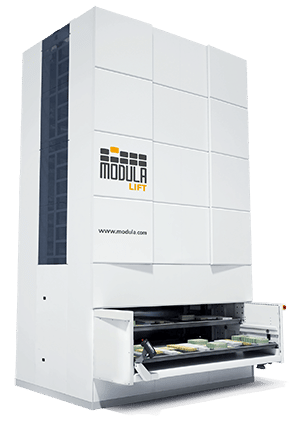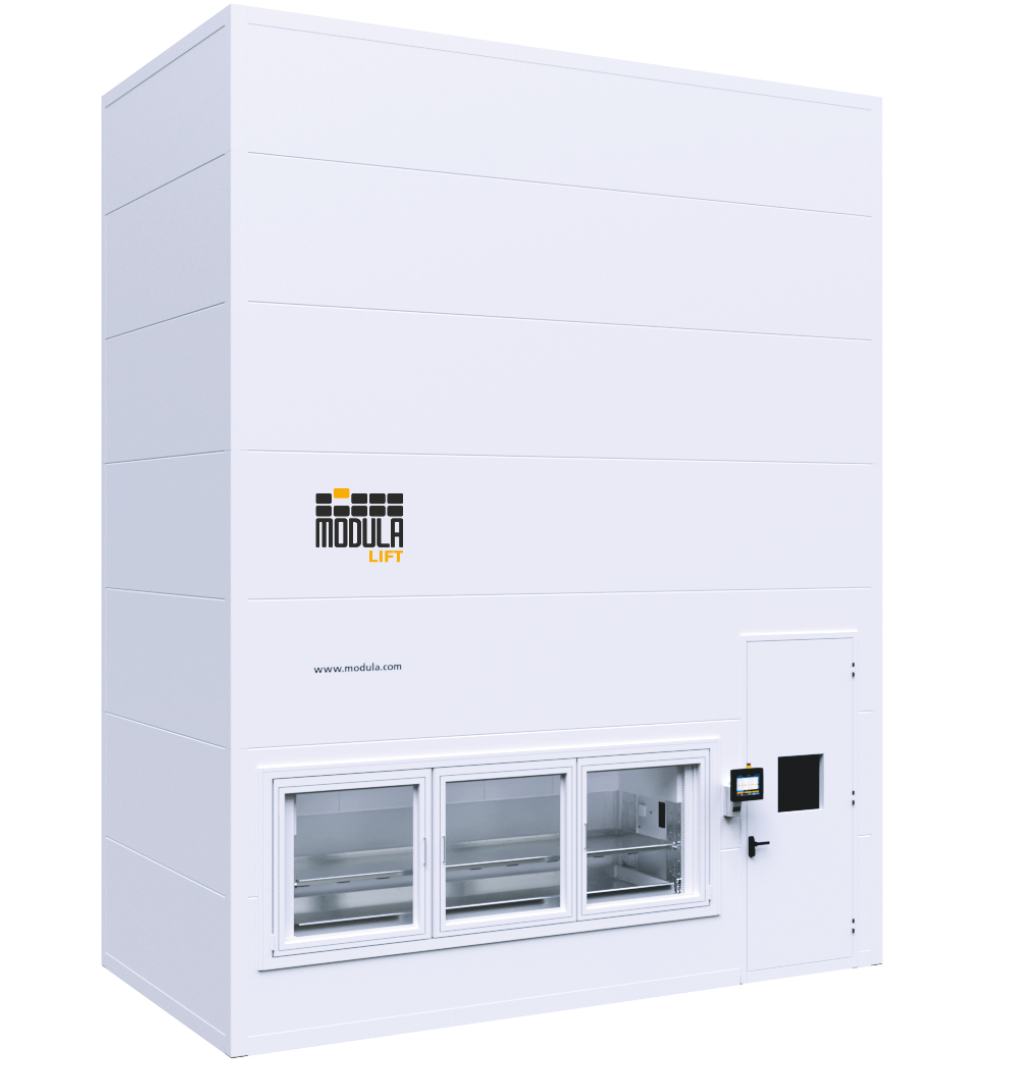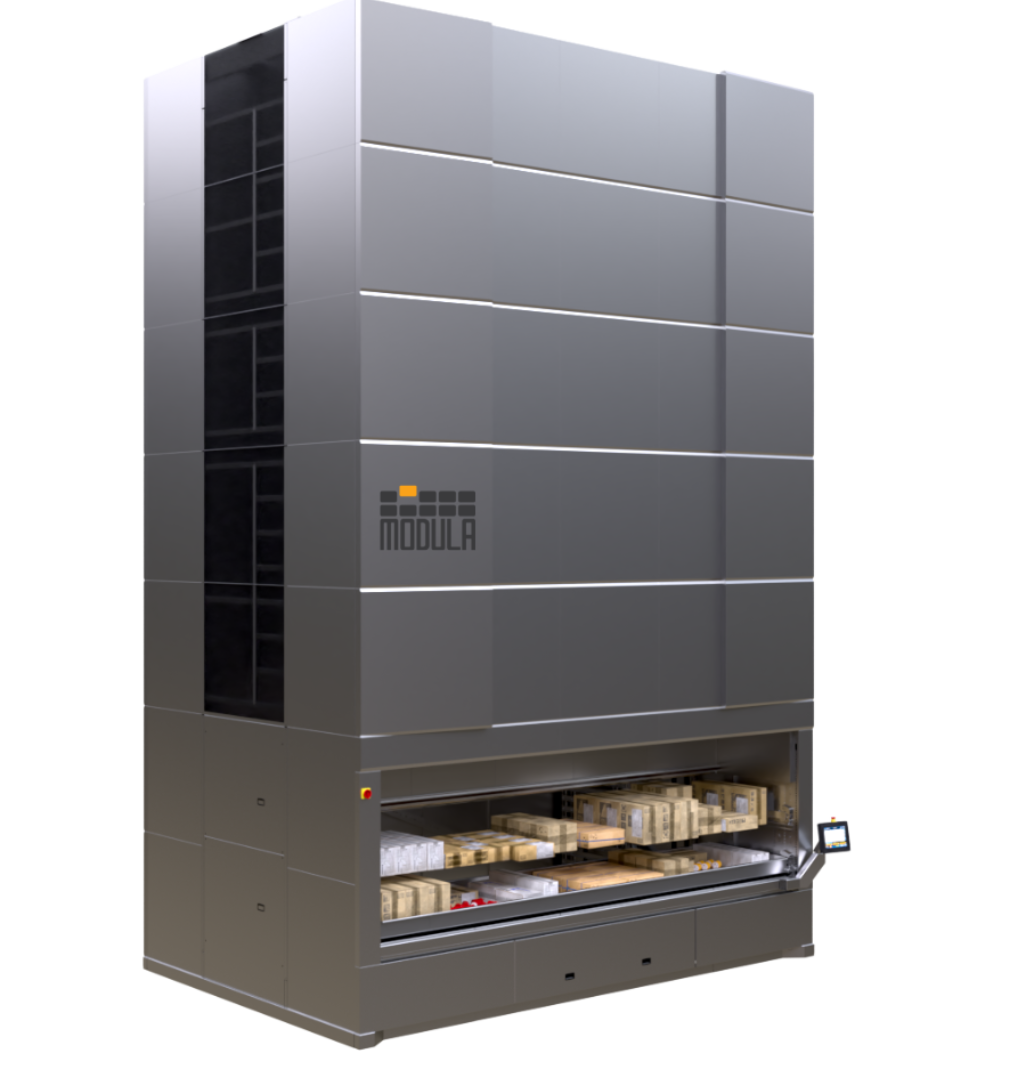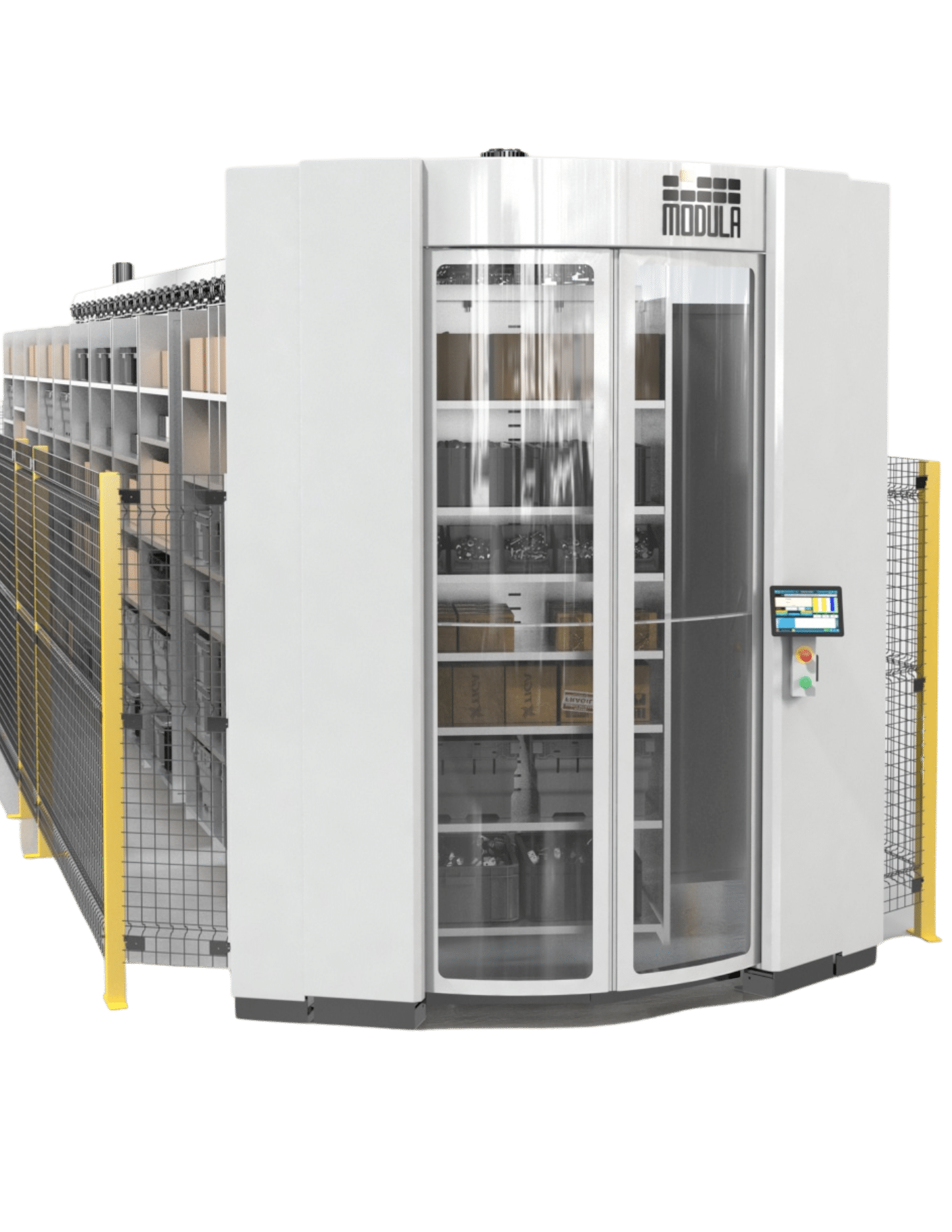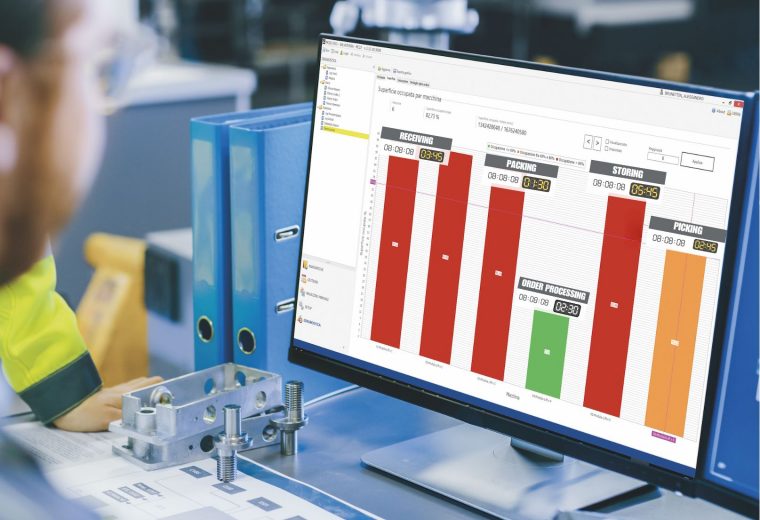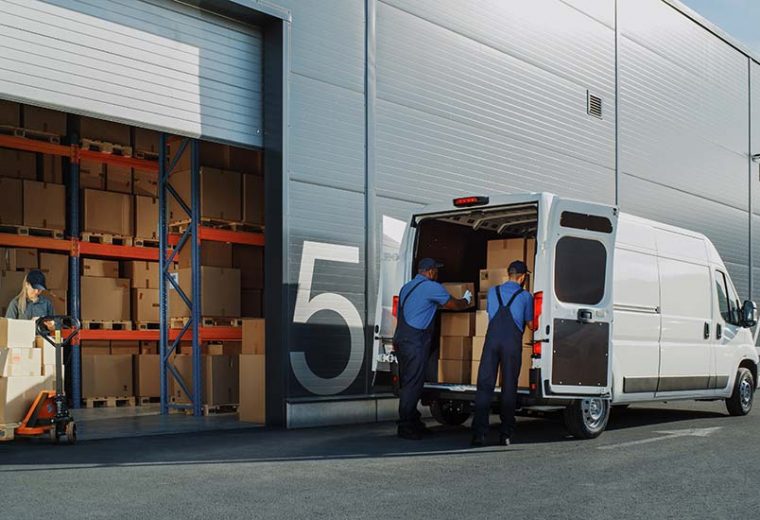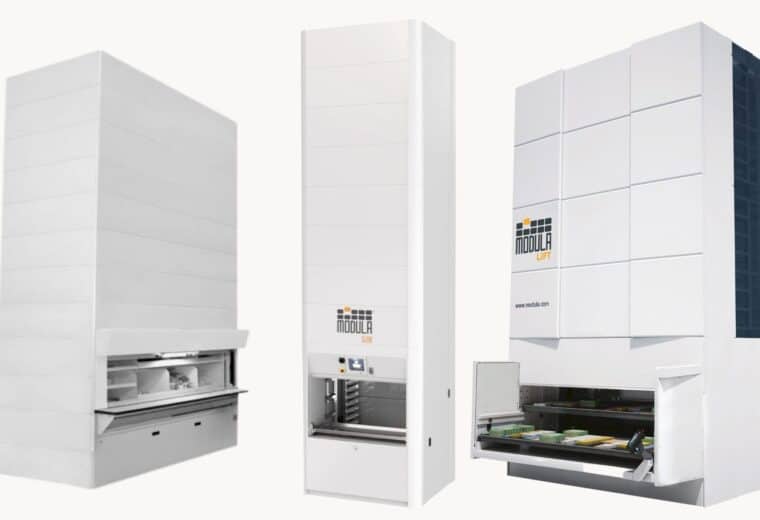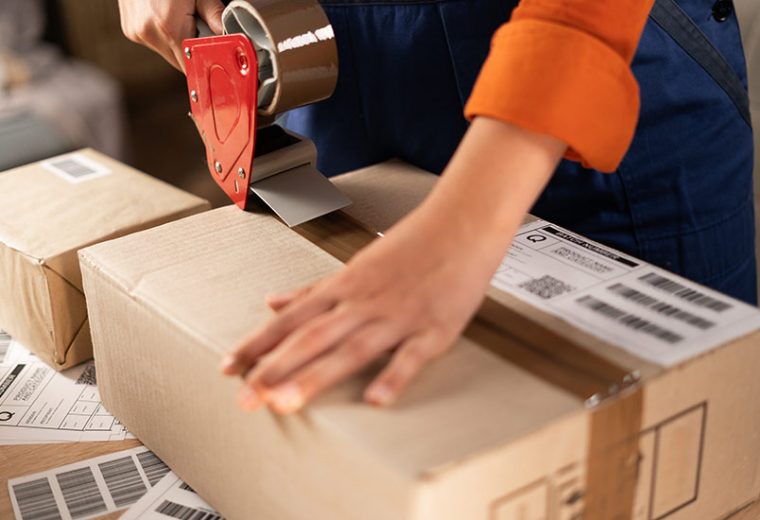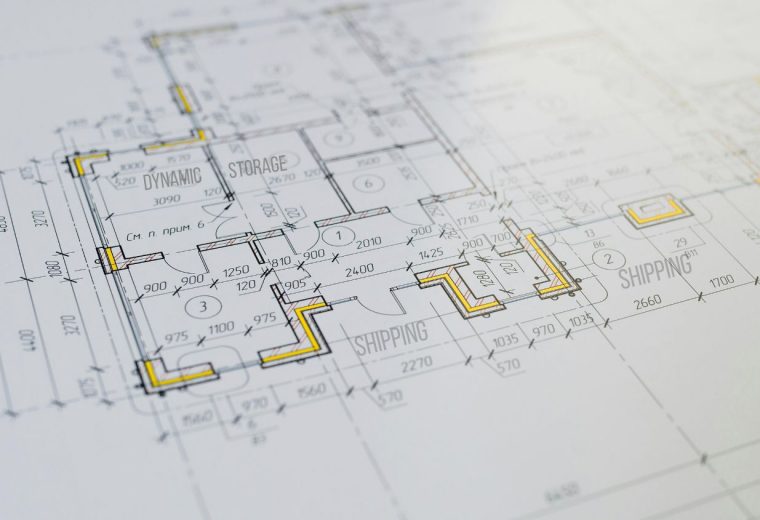Food Warehousing [Requirements, Challenges & Solutions]
Each year, an estimated 48 million people in the United States get sick due to foodborne illnesses, according to the Centers for Disease Control and Prevention.
Behind this alarming figure lies a critical issue: how food is stored, handled and transported through the supply chain.
Food and beverage warehouses operate in a uniquely demanding environment. From maintaining strict temperature and humidity controls to managing fast-moving perishable goods, these facilities face daily challenges that go beyond standard inventory management.
Add growing regulatory requirements and frequent supply chain disruptions, and it becomes clear: traditional storage methods alone are no longer enough.
As consumers become increasingly concerned about the safety and quality of what they eat, food warehouses must raise the bar — one that safeguards public health, reinforces trust and protects brand reputation.
In this article, we’ll explore:
- The most common operational and regulatory challenges in food and beverage warehousing
- Why compliance with food safety standards is essential
- How automation — especially climate-controlled storage solutions — can help ensure efficiency, safety and adaptability
Essential Requirements for Food Warehousing
Running a food warehouse requires strict adherence to a range of regulatory and safety standards. To operate legally and safely, facilities must meet the following key requirements:
- FDA registration – All food warehouses in the U.S. must register with the Food and Drug Administration (FDA).
- Certifications – Facilities often need certifications such as FDA registration, Safe Quality Food (SQF) certification and FSSC 22000 certification to demonstrate compliance with recognized food safety standards.
- State licensing – In addition to federal requirements, warehouses must also obtain state-level licenses and comply with the Food Safety Modernization Act (FSMA) guidelines to ensure the highest standards of food safety.
These measures help ensure that food products are stored in a way that minimizes contamination risks and complies with both federal and local regulations.
Types of Food Warehouse Storage
Because different food products have specific storage requirements, food warehouses must be equipped to handle a variety of environmental conditions. The main types of storage include:
- Dry storage: This type of food warehouse storage is suited for dry warehouses that store non-perishable goods such as canned foods, packaged foods and grains that require low humidity and good air circulation.
- Refrigerated storage: Fresh produce, dairy and certain processed meats need to be stored in refrigerated conditions to prevent spoilage. It’s essential to keep these items between 33°F and 39°F to maintain freshness. Additionally, proper air circulation is crucial to prevent cold or hot spots that could compromise food quality.
- Frozen storage: Crucial for frozen foods, this type of food warehouse storage requires temperatures of −18°C (0°F) or lower, achieved through cooling systems and optimal insulation. Backup power systems are vital to protect against power outages affecting shipments.
- Climate-controlled storage: Special items such as chocolate and wine need precise temperature and humidity control due to their sensitivity to minor variations, which can significantly affect quality, flavor and shelf life.
Common Misconceptions About Climate-Controlled Storage
Despite its growing importance, climate-controlled storage is often misunderstood. Let’s clarify some common misconceptions:
All Cold Items Can Be Stored the Same Way
Not all temperature-sensitive products have the same storage needs. Ice cream, for example, must be stored below −4°F (−20°C) to maintain texture and prevent melting. On the other hand, fresh vegetables stay crisp at around 32°F (0°C).
Applying uniform settings can lead to spoilage or reduced shelf life. Each product requires tailored temperature settings for optimal preservation.
Climate-Controlled Storage Is Only for Frozen or Refrigerated Goods
This is a common misconception. Many dry products — such as spices, flour, chocolate, and wine — are highly sensitive to temperature and humidity fluctuations. Climate control ensures product stability and extends shelf life, even in non-frozen environments.
Regulatory Compliance Only Applies to Manufacturers, Not Warehouses
Warehouses play a critical role in food safety and are subject to the same strict standards. Failure to comply can result in penalties, product recalls, or even facility shutdowns. Having the right storage systems in place supports both operational efficiency and regulatory compliance.
Outsourcing Temperature-Controlled Storage Is Too Expensive
Outsourcing temperature-controlled warehousing can be cost-effective in the long run.
It reduces the need for specialized in-house storage facilities and personnel, eliminates spoilage and cuts overhead costs.
At Modula, our Climate Control and Clean Room special applications offer a return on investment (ROI) within six to 18 months.
For specific pricing details, contact our specialists and they can provide tailored information based on your needs.
5 Challenges in the Food and Beverage Warehousing Industry [+ Solutions]
Food and beverage warehouses face many of the same challenges that facilities across industries face, along with a few that are industry-specific.
Warehouse Capacity
Grocery e-commerce in the United States experienced a drastic uptick in demand after the worldwide pandemic, generating $100.7 billion in 2021 alone — an increase of around $20 billion compared to 2020.
To meet this demand, your food warehousing company must quickly expand product lines and SKUs to include more choices. As a result, your warehouse can reach maximum capacity at a faster rate.
To optimize your warehouse space to accommodate more inventory:
- Utilize automated storage and retrieval systems (ASRS) such as vertical lift modules or horizontal carousels
- Implement just-in-time inventory management to ensure you are only stocking up on inventory as needed
- Identify underutilized space. For example, dock areas are often used for loading and unloading inventory, but you can also use them for temporary storage
Supply Chain Disruptions and Rising Costs
Supply chain disruptions, caused by factors such as natural disasters or labor strikes, can affect the availability and cost of raw materials, transportation and labor.
In the food and beverage industry, these disruptions can also threaten product safety and quality, as perishable goods risk spoilage or contamination if not properly transported and stored.
Moreover, rising costs significantly challenge food and beverage warehousing companies. Fluctuating prices for raw materials, labor, energy and transportation can strain profit margins.
To address the challenges of supply chain disruptions and rising costs in your warehouse:
- Diversify suppliers: Reducing reliance on a single supplier by diversifying your supply chain can help minimize the impact of disruptions caused by weather events or labor strikes.
- Leverage automation and robotics: Automation and robotics, including ASRS, can help boost efficiency, decrease labor costs and improve inventory accuracy. ASRS automatically retrieves and transports products to the picking station, reducing the need for manual labor and minimizing the risk of errors or delays.
- Utilize a warehouse management system (WMS): A WMS can help optimize your logistics and transportation operations by providing real-time inventory data, optimizing product placement and enhancing order-picking processes.
Food Safety Regulations
The food industry is highly regulated to ensure product safety for consumers.
Failing to follow these regulations can result in severe consequences, such as product recalls, fines and damage to your company’s reputation.
Food safety regulations are designed to prevent contamination and ensure that products adhere to specific quality standards. They encompass aspects such as food labeling, packaging, storage, material handling and distribution.
To prevent food contamination in your warehouse:
- Utilize storage solutions with controlled environments to help you manage specific temperature and humidity levels, reducing the risk of spoilage
- Regularly inspect your warehouse to identify potential sources of contamination, such as rodents and other pests
- Properly train all employees to ensure they understand food safety regulations, their roles in maintaining compliance and how to identify and prevent potential safety hazards
Employee Safety
Workplace accidents, including falls, slips, getting caught in equipment and being struck by an object can lead to serious injuries.
To reinforce employee safety within your warehouse:
- Leverage automated storage solutions that automatically transport goods to your warehouse employees
- Provide your warehouse employees with personal protective equipment (PPE), such as hard hats, safety goggles and gloves to protect them from potential hazards
- Require your staff to undergo warehouse equipment training
Inventory Management
Your food and beverage warehouse needs to store perishable food items and beverages that often have a limited shelf life.
While climate-controlled storage solutions can help prevent goods from being spoiled too soon, a reliable warehouse system is also needed to forecast demands and inventory levels.
To better manage your inventory:
- Implement an inventory management software that provides accurate data into your warehouse inventory levels, item movement and records, and unique identifiers
- Conduct regular inventory audits to identify excess inventory, slow-moving items, obsolete products and potential discrepancies in inventory records
- Anticipate changes in customer demand using forecasting tools and adjust inventory levels
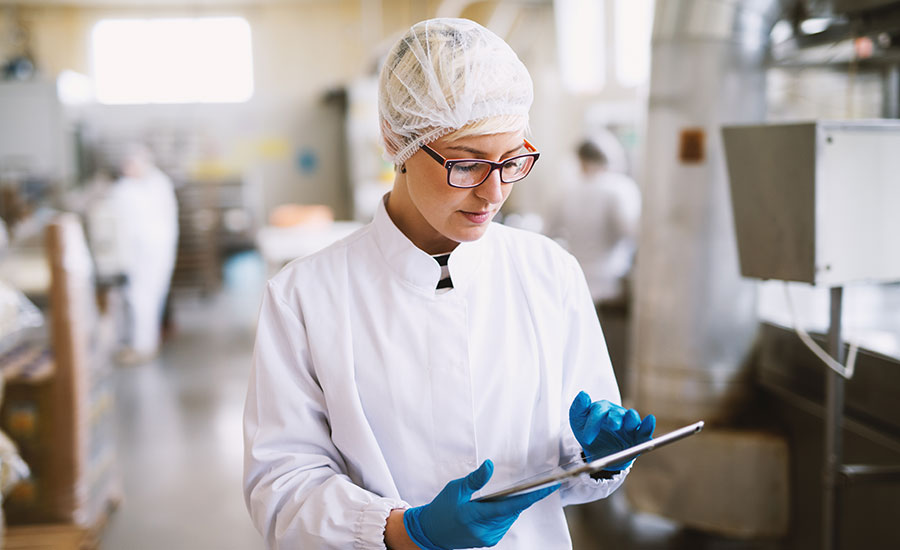
Key Benefits of an Automated Food Warehouse
From maximizing your existing warehouse space to preventing spoiled products, here are five reasons why warehouse automation is key to optimizing operations within your food warehouse.
Optimize Warehouse Space
When you implement vertical storage solutions in your operations, you can fully utilize the available ceiling height to store more perishable and non-perishable goods.
Expert tip: Read our guide on warehouse organization ideas for more space saving tricks.
Prevent Food Spoilage
With warehouse automation, you can prevent food spoilage by managing environmental factors such as temperature and humidity.
Controlled environment storage solutions utilize temperature controls and innovations like thermal insulation to maintain optimal storage conditions for perishable products.
Improve Inventory Management
Before you can implement the first in, first out (FIFO) method to ensure quality control, you need to have a clear overview of your inventory.
Inventory management solutions enhance your food warehousing by providing real-time data on inventory records, stock levels and movement.
This ensures that fast-moving items are quickly restocked and older goods are delivered before they spoil.
Check out how our Modula automated solutions can improve your warehouse space:
How To Choose the Right Climate-Controlled Storage for Your Food Warehousing Needs
When selecting climate-controlled storage for your food warehousing needs, it’s important to consider several factors to maintain the quality and safety of your products:
Identify Specific Food Storage Requirements
Different foods have varying storage needs.
For instance, seafood needs near-freezing temperatures to stay fresh and inhibit bacteria, while pastries demand moderate temperatures and controlled humidity to avoid staleness and mold.
Determine Capacity and Scalability
Assess your current inventory volume and future expansion plans. For example, if you plan to expand your frozen food line, ensure the facility can accommodate this increase without compromising existing storage capabilities.
Evaluate Technological and Security Features
Opt for facilities equipped with advanced monitoring systems that provide real-time data on temperature and humidity.
Moreover, ensure the facility has advanced security measures like access code entries and multi-factor authentication to protect valuable or high-risk items.
Ensure Regulatory Compliance
Compliance is key to preventing cross-contamination, managing allergens and avoiding foodborne illnesses.
Ensure the storage facility complies with all relevant food safety regulations, such as those enforced by the FDA or USDA.
Plan for Emergencies
Choose facilities with comprehensive contingency plans, including backup power and secondary cooling systems.
These features are essential for mitigating significant losses in the event of power failures or equipment malfunctions, particularly in areas susceptible to extreme weather or unstable power supplies.
Modula Solutions to Automate Your Food and Beverage Warehouse
As an industry leader in advanced storage solutions and warehouse management systems, Modula exemplifies commitment to innovation with next-level technologies.
This dedication allows us to deliver exceptional value to our customers worldwide.
Controlled Environment Storage Solutions
Safely store food and beverage products that are subject to temperature variations with Modula’s controlled environment storage solutions.
Our solutions help protect your inventory from temperature variations and contaminants, meeting industry standards and regulations.
Modula Climate Control
Modula Climate Control is equipped with a refrigeration system and thermal insulation that maintains your inventory at the required temperature and humidity.
Modula Climate Control allows you to:
- Control temperature from +2°C to +25°C (+35 °F to +77°F)
- Control relative humidity ≥ 5%
- Easily access stored inventory, thanks to the thermal break panel that can be independently opened outwards
Modula Clean Room
Ideal for food and beverage companies and warehouses that store perishable goods, Modula Clean Room protects food and drinks from contaminants such as dust particles, dirt and germs.
From dry goods such as dried pasta and flour to perishable items like dairy products, the Modula Clean Room storage system complies with ISO 14644 standards and meets class 7 and 8 requirements.
Our Modula Clean Room solution allows you to:
- Minimize air particles within your storage room to prevent food spoilage
- Obtain easy access through dual openings
- Gain access to clean room classifications ranging from 6 to 8
- Comply with ISO 14644-1 standard
- Lower exposure to contaminants, including dust, dirt, germs and bacteria
- Implement the same advanced technology to all Modula lift modules
Modula Vertical Lift Modules
If you’re looking for automated storage solutions that take up a minimum footprint in your warehouse, our Modula vertical lift modules (VLMs) are the solution you need.
From storing goods in a safe and secure environment to eliminating the need for your warehouse operators to reach high and low areas, our VLMs have a multitude of benefits.
Available in three models, our VLMs are vertical storage towers that range from 10 feet to 52’10 feet tall.
Our three VLM models include:
- Modula Lift: Our most popular vertical lift module. Ideal for heavy loads of up to 2,200 lbs while providing a throughput of up to 130 trays per hour.
- Modula Slim: For warehouses with a smaller footprint, the Modula Slim only takes up 32.29 square feet of floor space.
Modula Horizontal Carousel
For high-speed picking operations where the ceiling height is low, opt for our Modula horizontal carousel (HC).
Boasting flexibility and a compact structure, Modula HC fits perfectly in warehouse areas where space is limited.
Modula HC allows you to:
- Increase your productivity with picking rates of up to 550 lines per hour
- Boost picking accuracy by up to 99% with simple visual picking aids
- Provide the safest working environment for your warehouse operators by eliminating warehouse travel time and reducing physical strain
- Monitor and document all picking operations
- Adjust shelf spacing and reconfigure pods to meet seasonal demands
Modula Warehouse Management System
Gain complete inventory visibility with Modula’s intelligent and advanced software system.
The Modula WMS is comprehensive inventory management software built to operate Modula’s ASRS.
If you have a traditional warehouse with manual storage solutions, it can also act as a standalone software.
Our Modula WMS allows you to:
- Manage and track individual goods and monitor stock levels in real time
- Track orders, from processing to delivery
- Set access levels and permissions for your warehouse operators and track their activity
- Monitor the performance of your warehouse operators
- Identify and resolve system errors, analyze statistics and generate reports
- Connect and share data with other software and systems, thanks to data entry or file import/export
Call-to-action:
How Modula’s Automated Storage Solutions Optimized Warehouse Operations for Leading Food and Beverage Companies
Many leading companies worldwide have adopted Modula’s automated storage solutions to streamline their operations.
These companies utilize these solutions to serve production lines and store components and spare parts for maintenance departments.
As a result, they have significantly reduced the time spent searching for and transporting goods, optimized space utilization and minimized the physical effort required by operators.
Some examples include:
- Vonpar Refrescos, a Coca-Cola bottler in South America, uses 13-foot-wide trays in their VLMs to store bulky parts required for format changes.
- Sidel uses a pair of Modula units to serve packaging machines and filling lines for drinks, storing replacement parts for machines or finished products.
- Barilla, in its Parma plant, uses external bays in vertical storage solutions to hold bulky dies used to cut pasta, employing robots, manipulator arms, and lifting devices to handle dies that can weigh up to 440 lbs.
- Grissin Bon, Centro Carni di Padova and Pane Morato use the same type of vertical storage solution to stock spare parts needed to maintain production plants.
- Syngenta Seeds, located in the state of Washington, purchased two VLMs to store seed samples and support lab operations in a controlled climate environment, providing significant space savings and reporting features to track crop information.
- Inalca (Cremonini Group) purchased three Modula units, one of which is used in the cold storage area, thanks to Modula’s ability to operate at temperatures as low as 32°F.
- Aurora Organic Dairy, a dairy farming and milk bottling operation, purchased four Modula units for its facilities in Missouri and Colorado. Two Modula Lift ML75D units are used to store maintenance parts for processing equipment, while the other two units are employed in the sample testing area in a temperature-controlled environment
- Spendrups, one of the largest beer producers in Sweden, uses a Modula VLM to store low-movement products as well as inventories of finished products such as boxes of beer and wine.
- Jin Ding, a Taiwanese food company, has eliminated picking errors and speeded preparation of orders. As Jin Ding’s warehouse manager, Jarry Liu, says, “Now three or four workers can do the same job that previously would have required eight to 10 workers. Modula units have dramatically supported our work efficiency while eliminating picking errors.”
Another popular application of Modula Vertical Lift Modules (VLMs) in the food and beverage industry is label storage.
Using Modula’s warehouse management system (WMS) software and the user-friendly Copilot operator console, operators can retrieve inventory with a single click and set up labels as needed during production.
Prominent companies like the chocolate producer Venchi and wineries such as Colli del Soligo, Cantine Mezzacorona and Contri, have each deployed at least one Modula unit to store and track all their labels.
This process has also been adopted by several vinegar and olive oil producers, including Acetificio Ortalli, Acetaia Leonardi and Bunge.
A Closer Look at Modula Case Studies in the Food and Beverage Industry
From winemakers to online grocers, our automated storage solutions help food and beverage companies safeguard their inventory and employees, maximize floor space, and achieve accurate order picking.
Explore how our solutions have benefited two food and beverage companies:
Mezzacorona Group
Mezzacorona Group is a cooperative of 1,600 winemakers, located in the northern Italian province of Trentino. The company bottles wines for six regional brands.
The challenge:
Mezzacorona Group needed a better solution to store and handle their wine labels that were deteriorating.
On top of this issue, their warehouse operators were experiencing picking issues, due to the lack of a warehouse inventory system.
In addition, the rolls of wine labels were too heavy, making it difficult for operators to transport the labels over to the production line.
The solution:
Mezzacorona installed two Modula vertical lift modules (VLMs).
Thanks to these modules, Mezzacorona was able to save warehouse space, protect their wine labels from deterioration, speed up product retrieval and ease the physical burden on warehouse operators.
Tulips
Tulips is the first Italian e-grocery player to guarantee delivery within three hours of ordering.
The challenge:
Tulips had to meet growing customer demand for quick home delivery and in-store pick-up.
The company needed reliable automated solutions to help them achieve accurate order picking, while optimizing their warehouse space and reducing the need for manual labor.
The solution:
To help meet consumer demand, Tulips installed six Modula MC 50 D Lifts. The vertical solutions maximized their warehouse space, decreased warehouse travel time and improved the order fulfillment process.
In Conclusion
At Modula, we help you reimagine your warehouse operations with our automated storage and retrieval systems and warehouse management solutions.
Get in touch with our team to request a warehouse audit and find out how our solutions can work for you.
